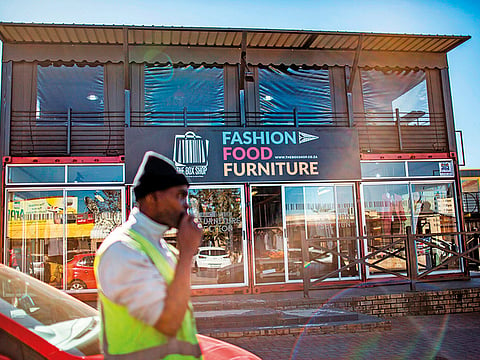Soweto’s urban entrepreneurs take on the world
Buyers worldwide can purchase many products of Box Shop brands on its website

SOWETO, South Africa
At the back of Mandisa Zwane’s typical yellow plaster-clad Soweto house is a bustling hive of activity set to a soundtrack of gospel music and crying babies that emanates from nearby.
Every day the 42-year-old fashion designer packs into her small improvised workshop surrounded by sewing machines and brightly coloured spools of thread.
When she began making her distinctively bold and bright African print garments in South Africa’s most famous township in 2009, she made just three every month.
“Before I was just making for friends and family — and they weren’t even paying! Then I was able to hire four people to grow,” she told AFP.
Zwane is one of dozens of township entrepreneurs whose creations have sold worldwide with help from Soweto’s Box Shop, a not for profit organisation helping local designers and craftspeople market their creations internationally.
She now sells her designs as far away as Atlanta and London, making up to 60 pieces every month supported by her four-strong team which includes two salespeople, a tailor and an assistant.
“I was just playing with my passion then they came in and helped me organise my business financially,” she said of the Box Shop, situated just miles away from her Soweto base.
“My ambition is to take my brand to the world — I want to be the go-to for contemporary African design.”
Zwane, who lived in Benin for seven years, travels to the West African country every two months to source the materials which she transforms into dresses, skirts and trousers.
Buyers worldwide can purchase many products of the Box Shop’s 43 local brands on its website, while a larger selection is available for South African and international visitors at its physical store in Soweto.
The store is made of large metal shipping containers, giving the project its name, and hosts offices, a coffee shop and will soon be extended to include a hair salon and a radio station.
The hilly tourist hub is one of the most famous in Africa and is the site of Nelson Mandela’s one-time house as well as one of Desmond Tutu’s current homes.
“It’s about access to market — taking backyard fashion designers, backyard furniture makers who don’t have a place to showcase their products,” said Xolo Ncanywa, a consultant on the project. “We want them to be the next IKEA.”
The entrepreneurs on the scheme receive mentoring, practical assistance and investment advice from Box Shop’s team of 11 experts. Such hands-on “start to finish” support for small-scale entrepreneurs is a first for South Africa.
Designers and manufacturers like Zwane pitch their ideas to the Box Shop, which is backed by US-based not-for-profit TechnoServe, to win support for their products.
“Selling out of their car boots, they were always doomed to be small ... This changes all that,” said Shungu Kanyemba, co-founder of the Box Shop.
The Box Shop gives the successful entrepreneurs feedback on their plans and advises on sourcing materials and finance, handling personnel issues and managing their operations.
It also takes a risk on the entrepreneurs it chooses: the Box Shop advances money for the raw materials for products to be sold on the website so the entrepreneurs are not out of pocket.
The Soweto store now carries an eclectic range of products that includes bespoke speakers, shoes, furniture, clothes, cosmetics and freshly-brewed coffee.
Despite receiving support from banking giant Citigroup’s philanthropic foundation, the project is not charity. It recoups its operating costs when the entrepreneurs make their profits when their objects sell on the website.
The store in Soweto opened in 2016 and has since signed-up 80 different small-scale entrepreneurs. It now makes around 100,000 rand ($7,800, 7,000 euros) in sales per month.
The Box Shop team are already picking a site for another store, this time in Durban, as well as planning 15 ‘pop-up’ locations to coincide with major events.
Despite the government spending six billion rand developing the townships in 2016 and vowing to make small-scale entrepreneurship part of its economic strategy, South Africa’s townships are struggling to become hubs of commercial activity.
A citizen of Egypt or Burkina Faso is six times more likely to start a business than a South African, according to the Global Entrepreneurship Monitor group.
But with about half its urban population living in townships — 38 per cent of working-age citizens — South Africa is hoping that the nascent entrepreneurial gold-rush taking hold in Soweto will benefit the country’s poorest citizens.
Velaphi Mpolweni, 49, began making home furnishings from the back of his modest Johannesburg home in 2013.
“Before the Box Shop I had been struggling — people weren’t seeing my products,” he said at the bustling, sawdust-strewn Furntech community workshop on the edge of Soweto.
Mpolweni is now making 670,000 rand a year in sales, employs four men and has just inked a major deal to supply a chandelier to a client in the USA.
Oscar Hilary, 33, who lives in Soweto, has been employed by Mpolweni as a joiner for a year and credits his boss’ international exposure for keeping him in a job.
“It helps a lot,” he said. “It keeps us going.”



